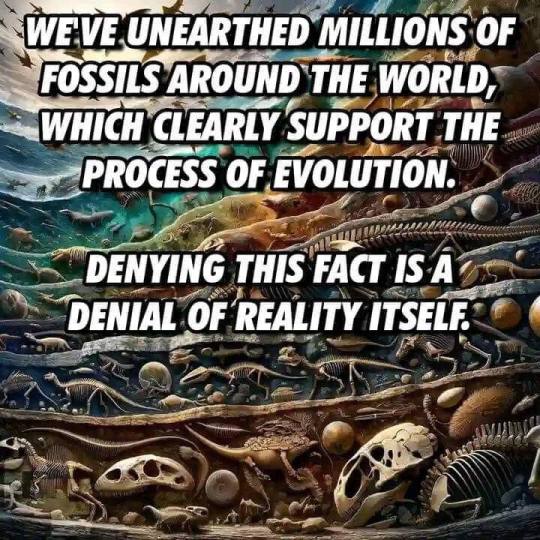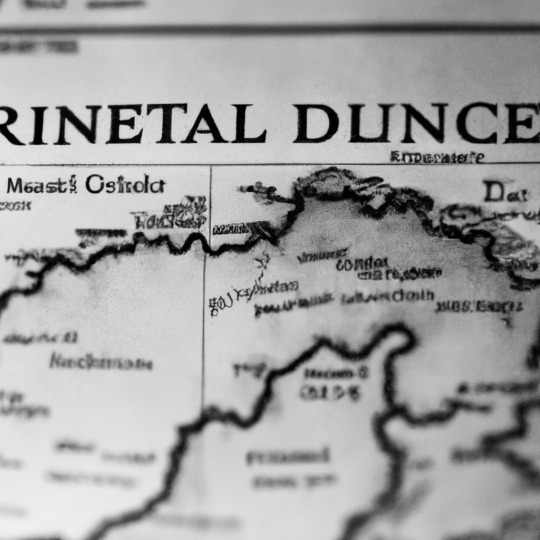#evolution denial
Text

"Evolution is a fact, not a theory. It really happened, and the fossil record and the molecular biology all confirm it. And yet, in this country, the United States, which is the leading scientific country in the world, we have people who are not only ignorant of science, but who are actively hostile to it and to the scientific method. And that is a serious problem, because science is not just a body of knowledge, it's a way of thinking. It's a way o skeptically interrogating the universe with a fine undersanding of human fallibility."
-- Carl Sagan
#Carl Sagan#evolution#theory of evolution#evolution is a fact#science#human fallibility#scientific method#what science is#fossil record#molecular biology#evolution deniers#evolution denial#religion is a mental illness
503 notes
·
View notes
Text
By Brett Wilkins
Common Dreams
Nov. 17, 2023
Seven of 12 proposed science textbooks for Texas 8th graders were rejected Friday by the Republican-controlled state Board of Education because they propose solutions to the climate emergency or were published by a company with an environmental, social, and governance policy.
The Texas Tribunereported that the 15-member board, which for the first time was required to include climate education for 8th graders, approved five of 12 proposed science textbooks, but called on their publishers to remove content deemed false or presenting a negative portrayal of oil and gas in the nation's biggest fossil fuel producer.
"America's future generations don't need a leftist agenda brainwashing them in the classroom to hate oil and natural gas," said Republican state energy regulator Wayne Christian, who had urged the board to choose books that promote planet-heating fossil fuels.
Some board members also objected to textbooks that did not include alternatives to the theory of evolution. One textbook was approved only after the removal of images highlighting that human beings—taxonomically classified as great apes—share ancestry with monkeys.
"Teaching creationism or any of its offshoots, such as intelligent design, in Texas' public schools is unlawful, because creationism is not based in fact," Chris Line, an attorney with the Freedom from Religion Foundation, said Friday. "Courts have routinely found that such teachings are religious, despite many new and imaginative labels given to the alternatives."
"Federal courts consistently reject creationism and its ilk, as well as attempts to suppress the teaching of evolution, in the public schools," Line added.
State standards approved by the board's conservative majority in 2021 do not include creationism as an alternative to evolution. The standards also acknowledge that human activities contribute to climate change.
Despite an overwhelming scientific consensus that human activity—primarily, the burning of fossil fuels—drives global heating, Republican board Secretary Patricia Hardy argued before the vote that such a stance amounts to "taking a position that all of that is settled science, and that our extreme weather is caused by climate change."
One textbook was rejected because its publisher has an environmental, social, and governance (ESG) policy. ESG frameworks account for workplace diversity, the treatment of employees, and preparedness for the climate crisis.
Democratic board member Marisa Perez-Diaz said during debate on the textbooks that "my fear is that we will render ourselves irrelevant moving forward when it comes to what publishers want to work with us and will help us get proper materials in front of our young people, and for me that's heartbreaking."
The National Science Teaching Association—a group of 35,000 U.S. science educators—on Thursday implored the board to reject "misguided objections to evolution and climate change [that] impede the adoption of science textbooks in Texas."
As in other GOP-run states, Texas officials have pushed book bans and other restrictions in schools and libraries, even as they portray themselves as champions of freedom. According to freedom of expression defenders PEN America, only Florida banned more books in schools than Texas during the 2022-23 academic year.
#texas#texas board of education#freedom from religion foundation#education#climate denial#fossil fuels#evolution#creationism#textbook banning
12 notes
·
View notes
Text
here is me living in denial: what won’t happen but what SHOULD happen
the whole luke may be dead crisis to garcia just showed her (unseen on screen however) that being with someone who is in this line of work is too much emotionally for her to handle, especially since she had left for mental health reasons, which is why she ended up kissing tyler even though she knew that luke was alive and well (i dont buy the bonding trama stuff bc she could easily have that with luke when the whole phil thing happened)
but then we have a serious conversation between garcia and jj and we get jj telling her that her and will have done it for years and of course its scary for will to have to constantly worry, but their love is strong enough to handle it, so when you love someone it’s worth trying even if you dont like what they do
that would be cute
18 notes
·
View notes
Text
gnawing on drywall. plurality that barely exists until you look at it on purposed. is so. many real reasons this state can occur and even last for years. but of course. the big one which brain leaps for at the drop of a hat. 'What if you're faking or overexaggerating to yourself. If nothing happens except when you poke it then how can it be organically real 🤔' which like. [KERMIT.JPG] ITS NOT FUCKING FAKING YOU PIECE OF SHIT DEBUNKER
#chat#me: wow i feel really comfy being medianish. i can still be plural while this is happening. it doesnt need to be super 'active' to be real#brain: [pkmn evolution noises] New tactic unlocked. What if all the past events were real but now it's done bc ur not trauma time anymore 🤔#me: Fuck. Shit. Shut up#sysjournal#its whatever . ijust read/watch stuff frm more obviously differentiated systems w better habits leading to good communication+daily activit#and im like [so jealous it makes me sick] which is honestly ironically probably coming from somewhere else in here#but our ability to identify ourselves is awful these days. seriously can't tell fuck or shit from shit or fuck#Can you believe it i think we switched drivers seat of the front row while writing this. WHILE sitting inside denial. ITS LIKE THAT
7 notes
·
View notes
Text
Make peace with the fact that …
Murphy's law: everything that can go wrong will go wrong. And among all the bad possibilities, the worst always the one that happens.
I used to have a hard time trying to understand this. But today I watched Interstellar again and I've been reading a little more about Murphy's law and I think I understand it a little better and I know how it applies to life.
I think this law is trying to warn us that we can't stop something from going wrong unless there's not even the slightest possibility for it to happen.
Example: If I am aware that I own some attitude in my personality that could make my relationship difficult with my future partner, I must know that as long as I continue to be that person, I cannot avoid condemning that relationship to defeat.
I think this law is trying to encourage us to take all the necessary precautions before embarking on a new journey. The idea ISN’T to eliminate risks because even by eliminating risks, other risks can be created. The important thing here is that: by assuming that any risky situation is actually 100% sure to go wrong, we can decide to take prior action and prepare ourselves, to the point that failing is a possibility that does not cause us stress or anxiety because we will have a pre meditated plan on how to deal with every problem that comes our way. Focus on the solutions to every posible problem before it happens.
So applying this law I will go through life more attentive, more focused, more prepared, more certain of myself. I will feel less vulnerable when having difficult confrontations. This law allows you to set your expectations to the lowest so even if the worst case escenario happens, it won't affect you as much, you will be able to keep standing on your feet and not succumb to defeat. Always expect the worst… and you might be surprised by a richer life than you could ever imagine. Even difficult times can be a blessing.
Thank you Edward Murphy for this lesson.
- Rocket
#murphy’s law#interstellar#reflexión#journaling#journal#thoughts#Edward Murphy#real life#reality#dreams#fantasy#denial#acceptance#inner peace#self love#self evolution
2 notes
·
View notes
Text
Yeah okay I need to move out. If I have to deal with my mum any longer I'm going to actually completely lose it (moreso than I already have/am)
(admittedly while moving out would solve a lot of the problems currently plaguing me it'd also bring its own whole host of issues — some of which miiight be caused by my current issues and thus would be solved/rendered moot by moving out but just as many which likely wouldn't)
#she just walked into my room and told me that I need to get into/learn ai art because#''in three years it'll be the only way to get an art-related job''#(that's me condensing the argument into one line but that was the core point of it)#(this in addition to her thinking elon musk is a real life supergenius and not accepting any criticism I make of him#and her general transphobia homophobia and racism#and her regular attempts to make me discuss with her her conspiracy beliefs about aliens building the pyramids#and about some random indian kid predicting the future and also some set of cards that can be used to predict the future#(not tarot cards. it's like a set of cards she claims predicted 9/11 and the war in ukraine and things)#and her evolution denialism/creationism (we're atheists)#oh and that she regularly gets weird about whenever I talk to/interact with a/any girl(s)#(I'm aroace and even if I wasn't I am not the sort of person who should be in any kind of relationship anyway)#that's not comprehensive but it gets the point across)#(My dad also sucks but he spends most of the time outside the house or just watching tv and is slightly less. everything about his idiocy#so he's not near as constant a source of emotional stress and frustration)
2 notes
·
View notes
Text
every time i remember women are allowed to age i’m like oh thank god
#i didn’t realize how much internalize misogyny i was still carrying around until kind#*kind of recently#like i feel like the past year has revealed so much to me that i was in denial about#it’s also been very interesting as my gender has been more fluid this past year than it has in like a decade#and just really beginning to understand my relationship with womanhood and my experience with gender as a genderfluid person who sometimes#identifies as genderless and sometimes identifies as a woman and sometimes identifies as a guy#but overall identifies as queer trans and nonbinary and obviously genderfluid#i guess my whole life will be coming to understand these things and enjoy the journey and the evolution#but man i am really onto something now this this era of gender#the fog is clearing in a way that current me needs
3 notes
·
View notes
Text
going through old journals in final years of highschool is a fucking trip everytime
#the evolution of my imaginary world and family#my imaginary brother to whom i addressed every page of journal#the knowledge that he doesnt exist#the denial#the normalization of my less than normal life#holy fuck#you did good little me#i cant believe you fucking snapped out of it without help#fuck#this is entertaining to read but also disturbing#like#i was writing everyday 'i love you the most in the world' and 'i know you dont exist' in the same page#and like#i wasnt baby#i was 16 or 17#fucking fuck#luke's personal#luke rambles#luke overshares
2 notes
·
View notes
Text
Just browsing Bulbapedia, as you do, ahead of my next Hoenn playthrough, and for the first time I'm realising that Electrike is a dog..

For context, Ruby and Sapphire were my first games, and Electrike was a mainstay on my earliest teams, but only now am I finding out that it's a dog Pokemon,

A dog? This /\ is a dog? Maybe I'm the only one, and maybe this is part of the same combination of bad eyesight and Gen 3 graphics on my DS Lite that made me think Poochyena (WHICH APPARENTLY ISN'T A DOG) was plain black, but I always thought it was a lizard.

Seriously, look at this /\ thing. Look at it's head. Look at the crest on top of its head. Look at it's green colouration. Everything about it screams lizard. But no, apparently it's a puppy.
I don't even dislike dog Pokemon, I love Growlithe as much as the next guy, but you've got to admit they are over done, you're pretty much guaranteed to get a new one every gen, and next to them Electrike seemed to stand out, an electric lizard, quite a novel idea. But know it's yet another dog Pokemon, and our only electric lizard is Helioptile (which \/ looks more like a dog than Electrike).

Also, I do realise that Manectric looks a lot more like a dog, but I an talking about Electrike, the pre-evolution, specifically here.

Plus this is Pokemon, if they can have a fish evolve into an octopus, a lizard can become a dog.

#pokemon#electrike#electrike is a dog?#am I the only one who didn't realise?#manectric#poochyena#pokemon evolutions#remoraid#octillery#helioptile#bulbapedia#I guess bulbapedia could be wrong#good though it is it's still only a fan wiki#maybe that's just the denial talking#dog pokemon#lizard pokemon#dogs?#lizards?#fish?
0 notes
Text

"We've unearthed millions of fossils around the world, which clearly support the process of evolution.
Denying this fact is a denial of reality itself."
==
Whenever they ask for "proof" of evolution, they don't mean actual evolution. They want you to prove their dumbass strawman version, where a dog gives birth to a cat, an ape turns into a man, or a crocodile develops the body of a duck.
46 notes
·
View notes
Photo

It seemed as though the debate had been designed to amplify the silent yet relentless threat of climate denial. It was as if some deep-seated current had been running throughout the whole building, one that surged toward a kind of frenzied paroxysm. There were slices of knowledge so thin they seemed impossible to hold onto, as though the atmosphere was too rigid to allow such breathing space. With this strange tension in the air, the question of climate change would somehow be asked in spite of the obfuscation - the only direct answer was a now-infamous blankness of understanding. All around, the spectre of ignorance seemed to be growing more and more powerful, a looming entity that thought it was immune to accountability. It was a sadly fitting scene for the first Republican Presidential Debate and its devastating repudiation of scientific fact.
#Interview#Climate Crisis#Environment#GOP debate#GOP obstructionism#Politics and Elections#Presidential Debates#fault#Republican debate#climate change#denial#time machine#evolution
0 notes
Photo

American Ape
An excerpt from issue 134 of The Atavist Magazine.
https://longreads.com/2023/01/24/curious-case-of-nebraska-man-atavist-excerpt/
#Feature#Nonfiction#America#creationism#denialism#evolution#Faith#History#Madeline Bodin#science#The Atavist#Longreads
0 notes
Text
I keep wanting to make a post about Young-Earth Creationism but it is incredibly hard to summarize because it turns out that taking the Bible as a 100% literal description of scientific fact breaks things you wouldn't even think of.
It's the ideology that gets worse the longer you look. On the surface it's "lol evolution isn't real because god created everything" but when you investigate how this world of theirs actually works you get hit with "there is no consistent speed of light," "tigers and housecats are the same species and could interbreed," Noah's flood creating craters on the moon, wasps are literally, MORALLY evil, ongoing denial that any dinosaurs had feathers???, insistence that every carnivore can be vegan, plants not being alive, the whole incest thing, 
2K notes
·
View notes
Text
Evolutionary Theory vs. Structural-Functionalism.
[Don’t be too put off by the title of this post. It looks highfalutin. It may be, but the text isn’t.]
It’s a truism to say that our lives are finite and that we go through stages of development and change. But, it seems, sometimes we need to be reminded of obvious but possibly unwelcome realities. I’m sure we all understand that we follow a path of change starting at birth and ending at death.…
View On WordPress
#@evolution#@functionalism#@health-related statistics#@structural-functionalism#Becker#death#death denial#Ernest Becker#immortality#myeloma#Roger Albert#Roger G. Albert
0 notes
Photo



I may or may not have had a moment of weakness with the new art AI website.
‘Yamato Hikari wedding’ :
I've never seen Special A but sometimes that comes up when I search for my babies
‘Yamato and Hikari dating digimon’:
It's giving Naruto vibes / at least closer to Digi
‘Yamakari digimon’ :
OMG IT'S THEIR LITERAL CHILD
#Yamakari#Yamato x Hikari#Yakari#Hikari x Yamato#yamato ishida#hikari yagami#art AI#Dall e#Dall e ai#Digimon Tri#Digimon Adventure#5 stages of grief#In denial for most of them#I have another stage#It's being delusional#Matt Ishida#Kari Kamiya#Matt x Kari#Digimon Last Evolution#bread crumbs#OTP#crackship
0 notes
Note
When you tag things “#abolition”, what are you referring to? Abolishing what?
Prisons, generally. Though not just physical walls of formal prisons, but also captivity, carcerality, and carceral thinking. Including migrant detention; national border fences; indentured servitude; inability to move due to, and labor coerced through, debt; de facto imprisonment or isolation of the disabled or medically pathologized; privatization and enclosure of land; categories of “criminality"; etc.
In favor of other, better lives and futures.
Specifically, I am grateful to have learned from the work of these people:
Ruth Wilson Gilmore on “abolition geography”.
Katherine McKittrick on "imaginative geographies"; emotional engagement with place/landscape; legacy of imperialism/slavery in conceptions of physical space and in devaluation of other-than-human lifeforms; escaping enclosure; plantation “afterlives” and how plantation logics continue to thrive in contemporary structures/institutions like cities, prisons, etc.; a “range of rebellions” through collaborative acts, refusal of the dominant order, and subversion through joy and autonomy.
Macarena Gomez-Barris on landscapes as “sacrifice zones”; people condemned to live in resource extraction colonies deemed as acceptable losses; place-making and ecological consciousness; and how “the enclosure, the plantation, the ship, and the prison” are analogous spaces of captivity.
Liat Ben-Moshe on disability; informal institutionalization and incarceration of disabled people through physical limitation, social ostracization, denial of aid, and institutional disavowal; and "letting go of hegemonic knowledge of crime”.
Achille Mbembe on co-existence and care; respect for other-than-human lifeforms; "necropolitics" and bare life/death; African cosmologies; historical evolution of chattel slavery into contemporary institutions through control over food, space, and definitions of life/land; the “explicit kinship between plantation slavery, colonial predation, and contemporary resource extraction” and modern institutions.
Robin Maynard on "generative refusal"; solidarity; shared experiences among homeless, incarcerated, disabled, Indigenous, Black communities; to "build community with" those who you are told to disregard in order "to re-imagine" worlds; envisioning, imagining, and then manifesting those alternative futures which are "already" here and alive.
Leniqueca Welcome on Caribbean world-making; "the apocalyptic temporality" of environmental disasters and the colonial denial of possible "revolutionary futures"; limits of reformism; "infrastructures of liberation at the end of the world."; "abolition is a practice oriented toward the full realization of decolonization, postnationalism, decarceration, and environmental sustainability."
Stefano Harney and Fred Moten on “the undercommons”; fugitivity; dis-order in academia and institutions; and sharing of knowledge.
AM Kanngieser on "deep listening"; “refusal as pedagogy”; and “attunement and attentiveness” in the face of “incomprehensible” and immense “loss of people and ecologies to capitalist brutalities”.
Lisa Lowe on "the intimacies of four continents" and how British politicians and planters feared that official legal abolition of chattel slavery would endanger Caribbean plantation profits, so they devised ways to import South Asian and East Asian laborers.
Ariella Aisha Azoulay on “rehearsals with others’.
Phil Neel on p0lice departments purposely targeting the poor as a way to raise municipal funds; the "suburbanization of poverty" especially in the Great Lakes region; the rise of lucrative "logistics empires" (warehousing, online order delivery, tech industries) at the edges of major urban agglomerations in "progressive" cities like Seattle dependent on "archipelagos" of poverty; and the relationship between job loss, homelessness, gentrification, and these logistics cities.
Alison Mountz on migrant detention; "carceral archipelagoes"; and the “death of asylum”.
Pedro Neves Marques on “one planet with many worlds inside it”; “parallel futures” of Indigenous, Black, disenfranchised communities/cosmologies; and how imperial/nationalist institutions try to foreclose or prevent other possible futures by purposely obscuring or destroying histories, cosmologies, etc.
Peter Redfield on the early twentieth-century French penal colony in tropical Guiana/Guyana; the prison's invocation of racist civilization/savagery mythologies; and its effects on locals.
Iain Chambers on racism of borders; obscured and/or forgotten lives of migrants; and disrupting modernity.
Paulo Tavares on colonial architecture; nationalist myth-making; and erasure of histories of Indigenous dispossession.
Elizabeth Povinelli on "geontopower"; imperial control over "life and death"; how imperial/nationalist formalization of private landownership and commodities relies on rigid definitions of dynamic ecosystems.
Kodwo Eshun on African cosmologies and futures; “the colonial present”; and imperialist/nationalist use of “preemptive” and “predictive” power to control the official storytelling/narrative of history and to destroy alternatives.
Tim Edensor on urban "ghosts" and “industrial ruins”; searching for the “gaps” and “silences” in the official narratives of nations/institutions, to pay attention to the histories, voices, lives obscured in formal accounts.
Megan Ybarra on place-making; "site fights"; solidarity and defiance of migrant detention; and geography of abolition/incarceration.
Sophie Sapp Moore on resistance, marronage, and "forms of counterplantation life"; "plantation worlds" which continue to live in contemporary industrial resource extraction and dispossession.
Deborah Cowen on “infrastructures of empire and resistance”; imperial/nationalist control of place/space; spaces of criminality and "making a life at the edge" of the law; “fugitive infrastructures”.
Elizabeth DeLoughrey on indentured labor; the role of plants, food, and botany in enslaved and fugitive communities; the nineteenth-century British Empire's labor in the South Pacific and Caribbean; the twentieth-century United States mistreatment of the South Pacific; and the role of tropical islands as "laboratories" and isolated open-air prisons for Britain and the US.
Dixa Ramirez D’Oleo on “remaining open to the gifts of the nonhuman” ecosystems; hinterlands and peripheries of empires; attentiveness to hidden landscapes/histories; defying surveillance; and building a world of mutually-flourishing companions.
Leanne Betasamosake Simpson on reciprocity; Indigenous pedagogy; abolitionism in Canada; camaraderie; solidarity; and “life-affirming” environmental relationships.
Anand Yang on "forgotten histories of Indian convicts in colonial Southeast Asia" and how the British Empire deported South Asian political prisoners to the region to simultaneously separate activists from their communities while forcing them into labor.
Sylvia Wynter on the “plot”; resisting the plantation; "plantation archipelagos"; and the “revolutionary demand for happiness”.
Pelin Tan on “exiled foods”; food sovereignty; building affirmative care networks in the face of detention, forced migration, and exile; connections between military rule, surveillance, industrial monocrop agriculture, and resource extraction; the “entanglement of solidarity” and ethics of feeding each other.
Avery Gordon on haunting; spectrality; the “death sentence” of being deemed “social waste” and being considered someone “without future”; "refusing" to participate; "escaping hell" and “living apart” by striking, squatting, resisting; cultivating "the many-headed hydra of the revolutionary Black Atlantic"; alternative, utopian, subjugated worldviews; despite attempts to destroy these futures, manifesting these better worlds, imagining them as "already here, alive, present."
Jasbir Puar on disability; debilitation; how the control of fences, borders, movement, and time management constitute conditions of de facto imprisonment; institutional control of illness/health as a weapon to "debilitate" people; how debt and chronic illness doom us to a “slow death”.
Kanwal Hameed and Katie Natanel on "liberation pedagogy"; sharing of knowledge, education, subversion of colonial legacy in universities; "anticolonial feminisms"; and “spaces of solidarity, revolt, retreat, and release”.
2K notes
·
View notes